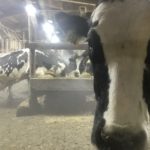Cold temperatures, or should I say frigid temperatures create a lot of challenges out on dairies. A lot of times you just go into survival mode. On top of everything else, sometimes the cows get loose for seemingly no good reason.
Although the loose manure could be caused by feeding too much protein or corn, there are three things that cause more problems in the winter.
1. Frozen silage
There is almost no way to avoid frozen silage or haylage when the temperatures turn sub zero. The frigid feed instantly cools the rumen environment, resulting in off-balancing the bacteria in the rumen. This results in loose cows and upset stomachs.
The best solution is to try and warm the feed before you feed it. Ok, if that isn’t an option, try feeding a little straw or hay in the diet, feed some yeast or use another rumen stabilizer to minimize the effect.
2. Winter Dysentery
Winter dysentery is pretty similar to us having the stomach flu. It is caused by a virus and can affect one cow at a time, or the whole herd at once. Production usually drops by at least 30% and sometimes up to 95%.
Dysentery has a distinctive smell, from feed that didn’t ferment properly in the rumen. It’s a key indicator that the cows have it.
Because winter dysentery is a virus, there’s not much you can do, except for waiting out. Hay really doesn’t firm up the diarrhea, neither will rumen stabilizers help. In severe cases, you can give charcoal boluses and probiotics to speed recovery, but mainly just time will help.
3. Mold
Most molds cause diarrhea that looks similar to dysentery, except it doesn’t have the smell.
We battle mold problems all year long sometimes, but what makes winter unique is the timing. Mold that was on the feed when it was put up for storage can continue to grow. In January-February, a couple of the coldest months, it’s usually concentrated enough to cause loose manure. And if it is causing loose manure, there are other problems as well.
The feed needs to be sampled then, to find out what the problem is-and not just a mycotoxin test. There are several molds that cause loose manure that don’t produce mycotoxins.
Using a good binder and rumen stabilizers help, but to really reduce the diarrhea, you’ll have to dilute the feed that is causing it.
